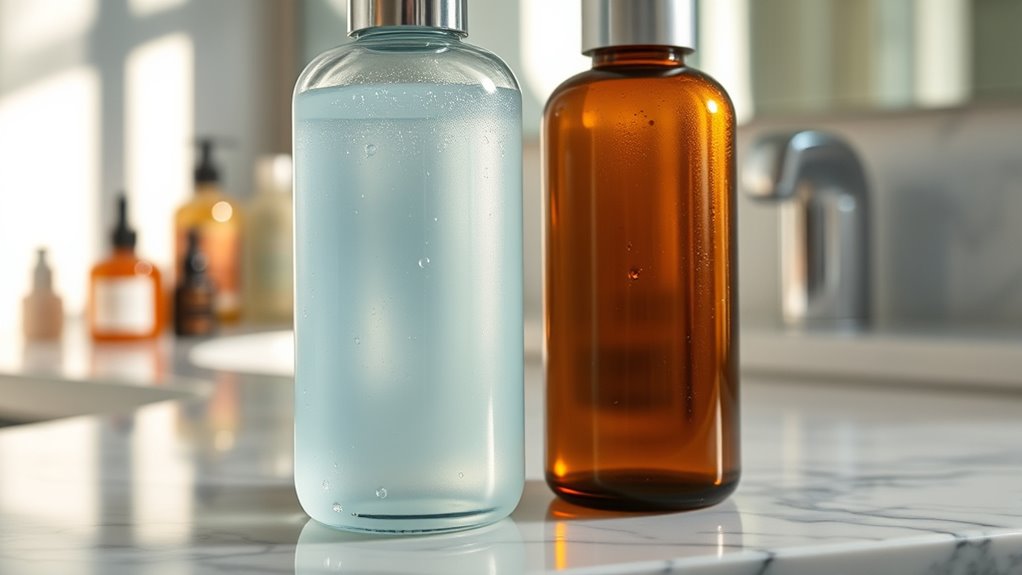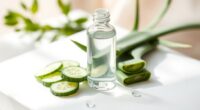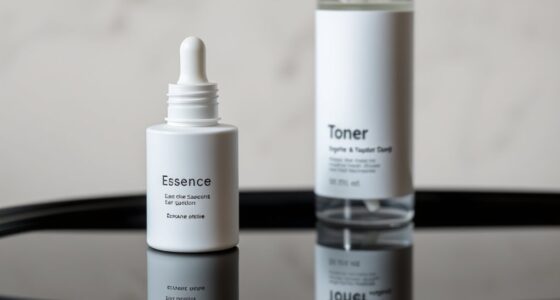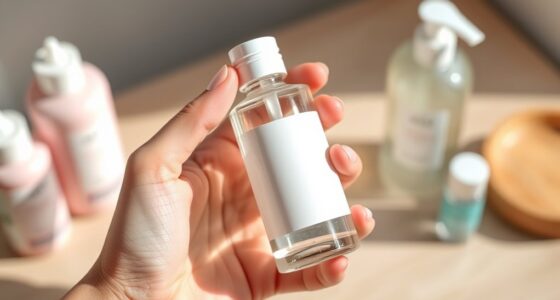Hydrating toners work to replenish moisture, leaving your skin soft and plump, ideal for dry or sensitive skin types. Astringent toners, on the other hand, tighten pores and control oil, making them suitable for oily or acne-prone skin. It’s a common myth that all toners do the same; understanding their differences helps you pick the right one. To discover how to choose the best toner for your skin, explore the details that follow.
Key Takeaways
- Hydrating toners replenish moisture and are suitable for most skin types, especially dry or sensitive skin, while astringents tighten pores and control oil.
- Hydrating toners typically contain gentle ingredients like hyaluronic acid and glycerin, whereas astringents may contain alcohol or salicylic acid for oil reduction.
- Overuse or harsh ingredients in astringents can cause dryness or irritation, whereas hydrating toners support skin barrier health.
- Proper selection depends on skin type: hydrate for dry/sensitive skin, use astringent for oily/acne-prone skin.
- The formulation technology and ingredient choice determine toner effectiveness and compatibility with individual skin needs.
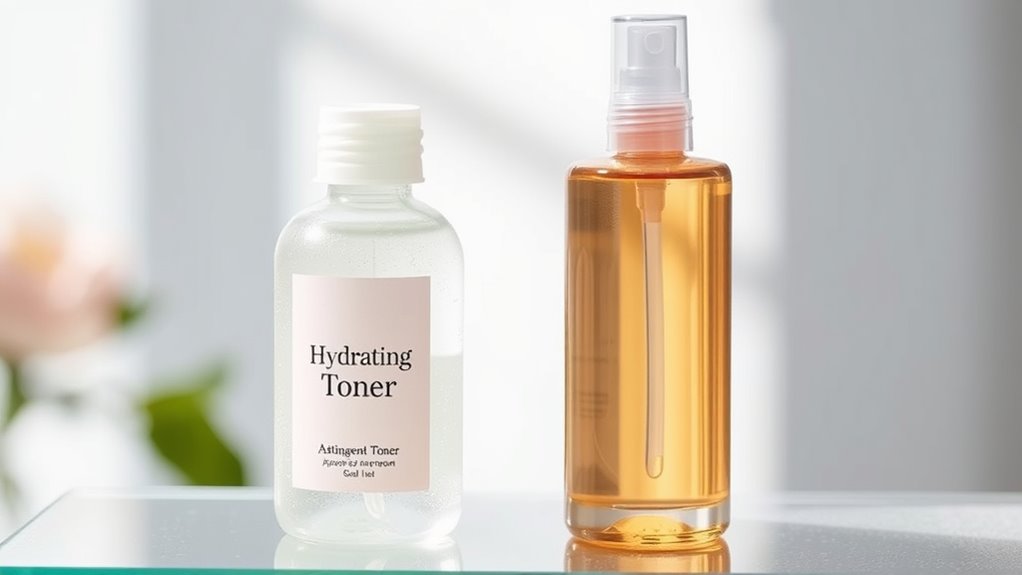
Have you ever wondered what sets hydrating toners apart from astringent ones? The main difference lies in their purpose and formulation. Hydrating toners focus on replenishing moisture, leaving your skin feeling soft and plump. They typically contain natural ingredients like aloe vera, hyaluronic acid, or glycerin, which attract and lock in water. These ingredients are gentle and suitable for most skin types, especially dry or sensitive skin that needs an extra boost of hydration. When choosing a hydrating toner, it’s important to weigh your skin type compatibility. If your skin feels tight, flaky, or dull, a toner with nourishing, natural ingredients can restore balance and improve texture without stripping away essential oils. Conversely, if your skin is oily or prone to breakouts, look for lightweight, calming options that won’t clog pores.
On the other hand, astringent toners are designed to tighten pores and reduce excess oil. They often contain stronger ingredients like alcohol, witch hazel, or salicylic acid that help control oil production and prevent acne. However, because astringents can be more drying and irritating, it’s essential to evaluate formulations that suit your skin type. For example, if you have dry or sensitive skin, an astringent with harsh chemicals could worsen dryness or cause redness. It’s wise to opt for natural ingredients like witch hazal or tea tree oil if you’re aiming for a more gentle approach. These natural alternatives can still provide oil control while maintaining skin barrier integrity. Understanding your skin type compatibility is key when selecting an astringent toner; using the wrong one can lead to irritation, increased sensitivity, and even more oil production as your skin tries to compensate.
Additionally, the technology behind different toner formulations impacts how effectively they deliver benefits without compromising skin health. In essence, the choice between a hydrating or astringent toner depends on your skin’s specific needs. Hydrating toners are ideal if you want to boost moisture levels, especially if your skin feels tight or dehydrated. They work well with natural ingredients that are gentle and compatible with most skin types. Astringent toners are better suited if you’re dealing with excess oil, enlarged pores, or acne-prone skin, but always choose formulations with natural ingredients that respect your skin’s sensitivity. Recognizing your skin type compatibility and understanding the role of natural ingredients can help you make an informed decision. This way, you’ll select the toner that best supports your skin’s health and keeps it looking fresh and balanced.
Frequently Asked Questions
Can Toners Replace Moisturizer in Skincare Routines?
Toners can’t substitute moisturizer in your skincare routine. While some toners act as moisturizer alternatives, most are designed to balance your skin’s pH or remove residuals. Moisturizers provide essential hydration and barrier support that toners can’t deliver alone. For best results, use a toner after cleansing and follow with a moisturizer suited to your skin type. This combination ensures your skin stays hydrated, protected, and healthy.
Are Alcohol-Based Toners Suitable for Sensitive Skin?
Ever wonder if alcohol-based toners are gentle enough for sensitive skin? If you have alcohol sensitivity or a compromised skin barrier, these toners might do more harm than good. Alcohol can strip moisture and cause irritation, making your skin feel tight or inflamed. Instead, look for alcohol-free options that support your skin’s natural barrier, keeping it balanced and calm. Isn’t your skin worth gentle, nourishing care?
How Often Should I Use Astringent Toner?
You should use an astringent toner sparingly, about 2-3 times a week, to avoid over-drying your skin. It helps with pore tightening and balancing your skin pH, but too much can cause irritation. Pay attention to your skin’s response and adjust frequency accordingly. Always follow with moisturizer to keep your skin hydrated and healthy. If you notice excessive dryness or redness, cut back on usage.
Do Hydrating Toners Work for Oily Skin?
Yes, hydrating toners can work for oily skin. They help with oil control by balancing your skin’s pH, preventing excess oil production. Unlike astringent toners, which can strip your skin and cause irritation, hydrating toners maintain moisture levels while calming your skin. Use them regularly after cleansing to keep your skin balanced, refreshed, and less prone to oiliness without sacrificing hydration.
Can Toner Cause Breakouts or Skin Irritation?
Toners can cause breakouts or skin irritation if they contain pore-clogging ingredients or irritation triggers. You might experience clogged pores or irritation triggers if the toner is too harsh or has alcohol, fragrances, or certain astringents. Always check labels, and choose formulas suited for your skin type. Testing a small patch first helps you avoid potential irritation triggers, ensuring your toner supports your skin without causing breakouts.
Conclusion
So, now that you’re armed with the truth, go ahead—ditch those confusing labels and pick a toner that actually works for you. Whether you prefer to hydrate or tighten, just remember: your skin doesn’t need a drama queen, it needs a partner. Don’t fall for marketing gimmicks—trust your skin’s vibe, not the hype. After all, who knew skincare could be this simple? Now, go conquer your beauty routine, toner in hand, and rule your glow!
